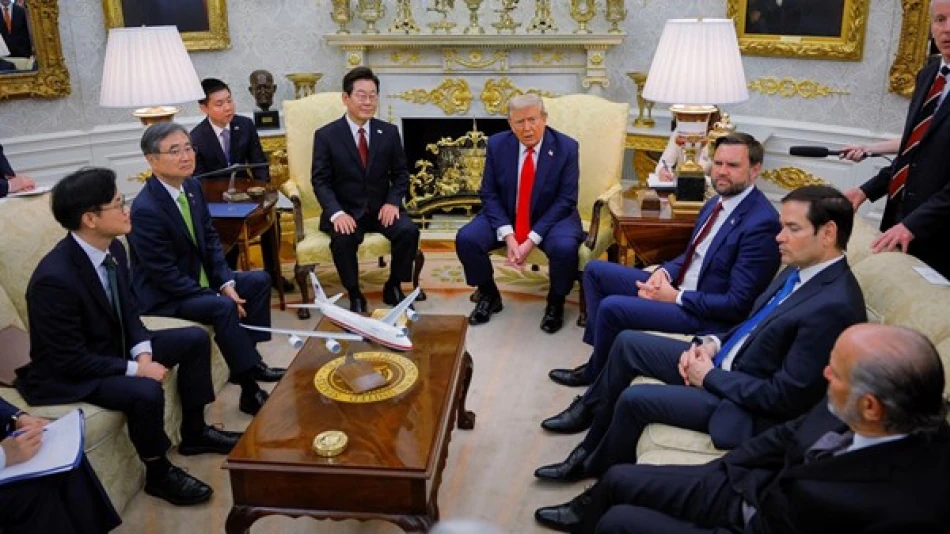
Trump Meets with South Korean President: Diplomatic Talks Aim to Strengthen Ties
Trump and South Korean President Strike Conciliatory Tone as Massive Trade Deal Takes Shape
President Donald Trump and South Korean President Lee Jae-myung met at the White House Monday, signaling a potential thaw in U.S.-Korea relations as both leaders emphasized economic cooperation over past trade disputes. The meeting comes as South Korea prepares to invest hundreds of billions of dollars in American businesses under a sweeping trade agreement outlined last month.
Diplomatic Reset After Trade Tensions
Trump congratulated Lee on his election victory and expressed "great warmth" toward South Korea, marking a notably friendly tone compared to previous tensions over tariffs and trade imbalances. The American president specifically highlighted potential collaboration in shipbuilding, a sector where South Korea's advanced capabilities could complement U.S. naval and commercial interests.
Lee responded by praising Trump's "peace-making efforts around the world," suggesting both leaders are eager to move beyond the trade friction that characterized earlier U.S.-Korea negotiations.
Hundreds of Billions at Stake
The centerpiece of Monday's discussions was the trade framework agreed upon last month, which promises to end the cycle of retaliatory tariffs that had strained bilateral commerce. Under the deal's terms, South Korea commits to investing hundreds of billions of dollars in U.S.-based business ventures.
Strategic Economic Implications
This investment pledge represents one of the largest foreign direct investment commitments to the U.S. in recent years, potentially rivaling similar deals struck with Japan and European allies. For American markets, the influx of Korean capital could boost sectors ranging from technology and manufacturing to infrastructure development.
From South Korea's perspective, the agreement provides crucial market access and regulatory certainty for its major conglomerates, particularly in semiconductors, automotive, and shipbuilding industries where Korean firms compete globally.
Beyond Economic Interests
The meeting also served as a crucial first encounter between the two leaders, allowing them to establish personal rapport despite their different political backgrounds. Lee's liberal orientation contrasts with Trump's approach, yet both leaders appeared focused on pragmatic cooperation rather than ideological differences.
This dynamic mirrors successful U.S. partnerships with other nations where economic interests have transcended political divides, such as America's deepening trade relationships with India and Vietnam despite different governance models.
Regional Security Undertones
While trade dominated Monday's agenda, the strengthened U.S.-Korea partnership carries significant implications for regional security, particularly regarding China's growing influence and North Korea's continued nuclear program. A more robust economic alliance provides both nations with greater strategic flexibility in addressing these challenges.
The shipbuilding cooperation Trump mentioned could prove especially significant, as both countries seek to counter China's dominance in maritime industries while strengthening their naval capabilities in the Indo-Pacific region.
Most Viewed News

 Layla Al Mansoori
Layla Al Mansoori






